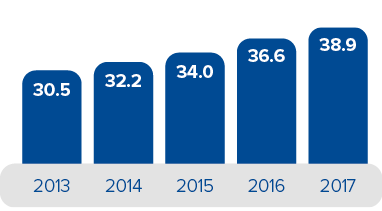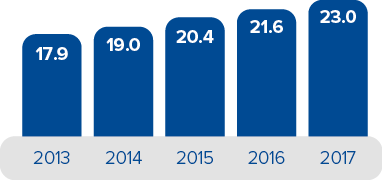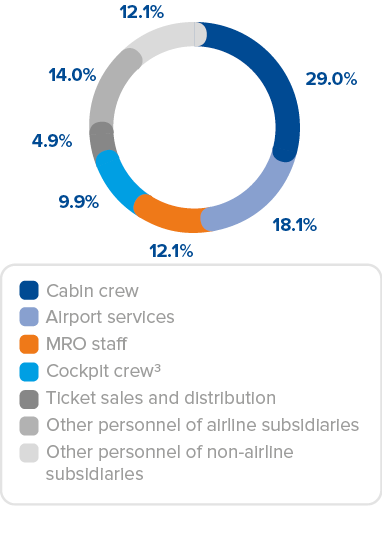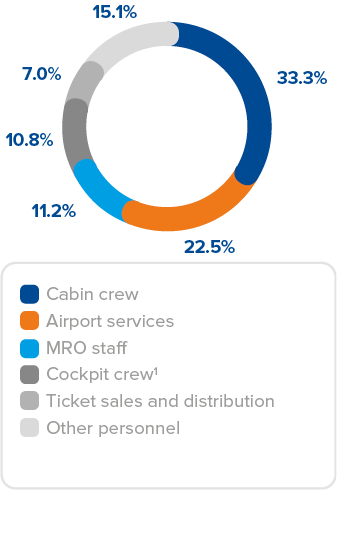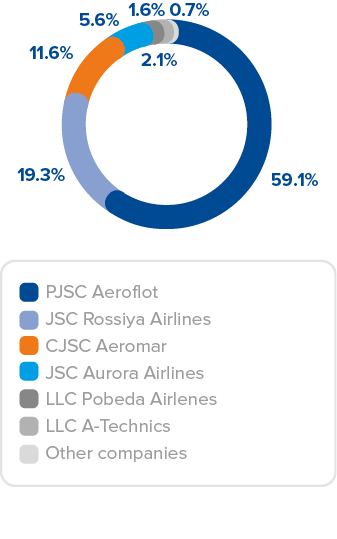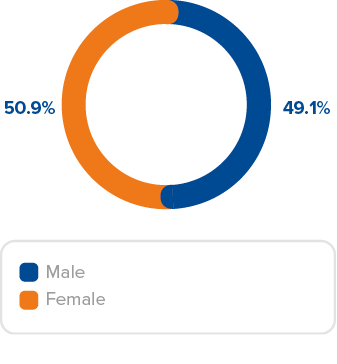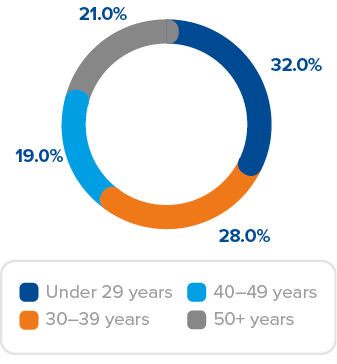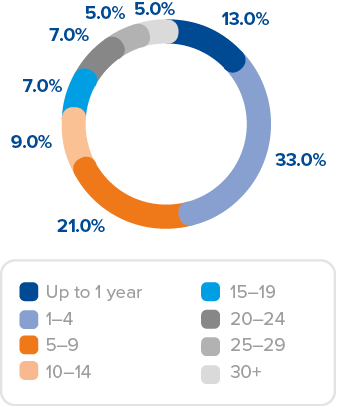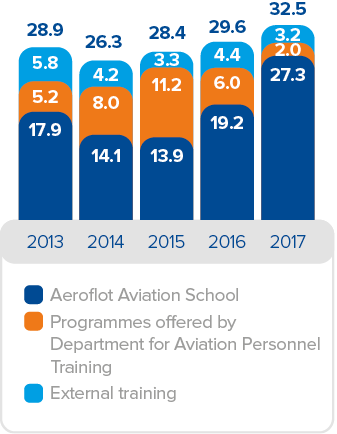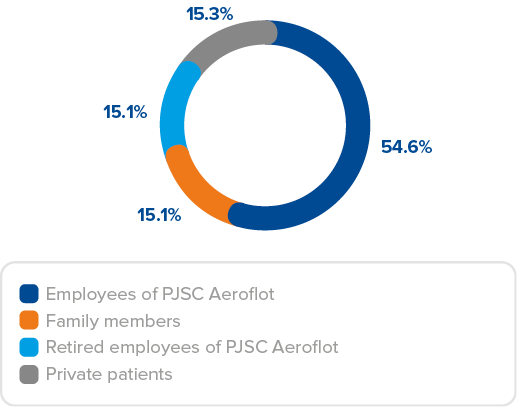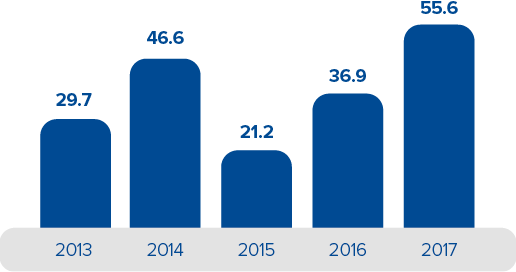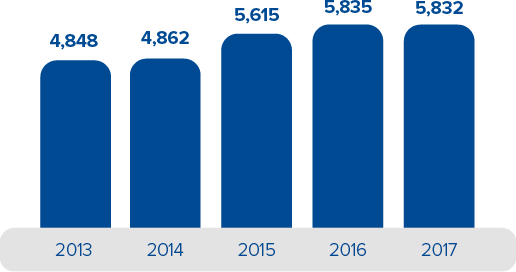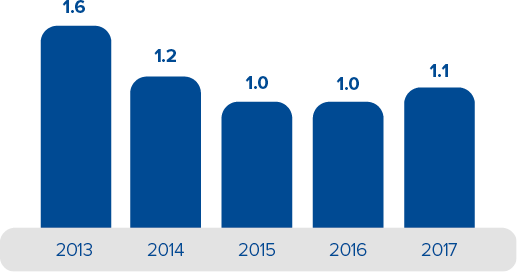HR Policy
Aeroflot Group’s HR policy is designed to expand the Group’s local and global market footprint and win the trust of passengers, partners, and all stakeholders. Aeroflot’s priorities include attracting and retaining talent and ensuring their professional development, improving economic efficiency in all areas of HR management, as well as fostering a unique corporate culture to ensure the Company’s strong competitive edge.
Aeroflot consistently reviews and enhances its employees’ compensation and benefit packages, and develops flexible incentive schemes helping each employee reach their full potential.
Priority areas of the HR policy:
- identify and attract candidates, including for cockpit and cabin crew positions;
- retain highly skilled employees;
- train employees, including training for working on new types of aircraft;
- build up the talent pool;
- conduct employee certifications;
- develop incentive systems;
- maintain high levels of employee loyalty;
- provide employees with social support;
- strengthen the Group’s positive image as the leading employer in the air transportation market.
PJSC Aeroflot has in place the Corporate Conduct Code, a list of ethical and moral standards that the Company accepts and shares. Aeroflot respects employees’ rights and freedoms, provides equal opportunities, and guarantees protection from any form of discrimination defined by both Russian and international laws. The Company prohibits any preference on political, religious, national or other grounds when implementing its HR policy and remuneration policy, and providing social benefits. The Company has never used and does not tolerate child, compulsory or forced labour.
Personnel structure1
As at 31 December 2017, the total headcount of Aeroflot Group was 38,870 employees , having increased by 6.3% year-on-year (36,556 employees as at 31 December 2016). The increase was driven by the fleet and route network expansion.
As at 31 December 2017, PJSC Aeroflot’s headcount increased by 6.7% to 22,991 employees (21,554 as at 31 December 2016).
Women account for 50.9% of Aeroflot Group’s total headcount. Specifically, the parent company PJSC Aeroflot employs 11,740 women, including flight attendants, office and maintenance service employees, as well as pilots. As at the end of 2017, 31 female pilots were employed by Aeroflot airline, five by Rossiya airline, and two by Aurora airline.
As at 31 December 2017, there were 38 non-resident pilots on PJSC Aeroflot’s headcount.
Personnel turnover at PJSC Aeroflot in 2017 was 6.8% (7.5% in 2016).
Recruitment
Recruitment to the Company is guided by the Regulations on the Procedure for Personnel Recruitment and Hiring dated 25 June 2010 and includes job posting on PJSC Aeroflot’s official website, corporate intranet portal, and dedicated websites, as well as in the media.
Furthermore, Aeroflot develops partnerships with educational institutions to attract promising young specialists and improve the quality of its future employees training. PJSC Aeroflot annually selects the best graduates of civil aviation educational institutions who will complete additional simulator training in compliance with corporate standards. Moreover, the Company’s business units engage graduates of industry schools and universities for on-the-job training and internships.
In the reporting period, the Company continued to participate in the targeted training programme financed from the federal budget. Contracts for targeted training were signed with three industry universities: the Saint Petersburg State University of Civil Aviation, Ulyanovsk Civil Aviation Institute, and the Moscow State Technical University of Civil Aviation. Over five years, 278 students signed educational contracts for targeted training committing them to work with the Company for a certain period of time. The first students enrolled in the programme graduated in 2017.
PJSC Aeroflot also continued to cooperate with seven civil aviation technical schools and universities under the Personal Scholarship project, including Ulyanovsk Civil Aviation Institute, the Saint Petersburg State University of Civil Aviation, Buguruslan, Sasovo, and Krasny Kut Civil Aviation Schools, as well as Egorievsk and Kirsanov Civil Aviation Technical Colleges. Each year, PJSC Aeroflot allocates up to 50 personal scholarships of RUB 10,000 per month. So far, 182 students received corporate scholarships.
In 2017, jointly with the Federal Air Transport Agency and United Aircraft Corporation, PJSC Aeroflot held its Best in the Sky contest for students of Ulyanovsk Civil Aviation Institute, and Sasovo and Krasny Kut Civil Aviation Schools. The best future pilots of the Russian commercial aircraft Sukhoi Superjet 100 were named following the contest.
Personnel training and development
The robust training and professional development process ensures that Aeroflot Group’s employees maintain high specialist skills in line with current requirements of international standards and the Federal Aviation Rules.
In 2017, PJSC Aeroflot arranged for training for 32,500 employees (some employees completed more than one training programme) both in-house and externally, across a range of training, retraining, professional development, and certification programmes.
In 2017, Aeroflot’s subsidiary, Aeroflot Aviation School private vocational educational institution, arranged for training for more than 27 thousand employees of PJSC Aeroflot. Retraining and professional development courses mainly focused on:
- ground handling and ground service operations;
- flight attendant training;
- pilot retraining on new aircraft types;
- engineering personnel training;
- aviation security;
- regulations for hazardous cargo transportation;
- occupational safety;
- foreign languages.
Training for more than 3,000 employees was arranged in external educational institutions and training centres under the following programmes:
- compulsory operations personnel training (training for special-purpose vehicle drivers and coordinators of special-purpose vehicle access to aircraft at the Sheremetyevo airfield; training for civil aviation state inspectors and inspectorial staff; training for electric car and forklift drivers; industrial safety, etc.)
- general training programmes (civil defence; environmental protection; professional development for accountants; marketing and management, etc.).
In the reporting period, the Company’s Department for Aviation Personnel Training delivered training to more than 2,000 employees, including retraining courses in new aircraft types for pilots, pilot in-command training for candidate pilots, initial training for pilot instructors, and training for examiners, as well as CRM courses and training in the flight safety management system.
In 2017, the Department developed 17 specialist training programmes. It was also certified for compliance with the Federal Aviation Rules dated 29 September 2015 approved by the Ministry of Transport of the Russian Federation and was granted an unlimited certificate as an aviation training centre.
A number of innovative projects were implemented, including the upgrade of FFS A320 and MFTD A320 flight simulators. The Company also completed works under the agreement with JSC Sukhoi Civil Aircraft to manufacture a procedure trainer for SSJ100 flight crew training. Furthermore, PJSC Aeroflot continued efforts to establish a comprehensive training centre for aviation personnel working on MC-21 aircraft.
Training platform
PJSC Aeroflot uses its own training platform providing training for cockpit and cabin crews of Aeroflot and its subsidiaries. The training platform is currently equipped with 23 modern simulators and mock-ups produced both in Russia and abroad. In the reporting period, a number of projects were implemented to enhance the quality of cockpit and cabin crew training using the Company’s own simulators, including the upgrade of simulators, and improvements to the flight control computer. More than 9,000 crews completed training on full flight and specialised simulators, while more than 4,000 employees completed training on Land–Water simulators and mock-ups for emergency response training.
Best in Trade professional skills competition
Aeroflot holds the Best in Trade professional skills competition to reinforce corporate culture, identify and reward the best employees, and promote the airline’s general trade jobs.
Approximately 700 employees representing 20 trades took part in the competition in 2017. The competition comprised four special categories: the Best Representative Office of Aeroflot in the Russian Federation, the Best Representative Office of Aeroflot Abroad, the Best Example of Aeroflot’s Values, and the Best Mentor. The winners received significant cash bonuses and a good incentive for career advancement.
Talent pool
PJSC Aeroflot continued building its talent pool. In 2017, key vacancies were filled with internal candidates listed in the talent pool for senior management positions, while the Company continued building the middle management talent pool and the talent pool for the Company’s representative offices abroad. As at the end of the reporting period, 149 and 131 employees respectively were included in those talent pools.
Incentive system
PJSC Aeroflot continues to develop its employee incentive system to improve operational efficiency and sharpen its competitive edge. The Company uses flexible incentive schemes and consistently enhances its employees’ compensation and benefits packages.
The Company’s remuneration system takes into account position grades, business unit performance, regional labour market specifics, as well as each employee’s personal contribution. The Company’s senior management performance assessment is based on key performance indicators approved by the Board of Directors.
The Company places special emphasis on attracting and motivating pilots through competitive pay levels and regular salary indexation. To attract qualified flight crews, the Company has in place a system of one-off incentive payments at hiring. The airline compensates pilots for training expenses through educational contracts incurred when quitting their previous job, or employees’ own expenses on their education.
The Company also widely uses non-financial incentives. In line with its Collective Agreement, Aeroflot rewards and recognises employees’ high performance. In 2017, two employees received government awards of the Russian Federation, 117 received industry awards of the Russian Ministry of Transport, and 20 received awards of other agencies. More than 1,200 employees were recognised with corporate awards.
Social programmes for Company employees
The Company runs a wide range of social programmes to create a comfortable environment encouraging employees’ professional and personal development, and ensure their social protection. Social programmes strengthen the Company’s competitive position, help attract qualified specialists, improve overall performance, foster a favourable social and psychological climate, and boost the Company’s profile as a socially responsible employer.
PJSC Aeroflot has in place a Collective Agreement which was extended until 1 December 2020 by the joint resolution of the employer and the employees’ representative on 10 August 2017. The social package described in the Collective Agreement considerably exceeds benefits, guarantees, and compensations established by applicable labour laws.
Occupational pension scheme
Aeroflot runs a pension scheme based on joint participation of the employer and the employee. Occupational pension is funded from employees’ monthly pension contributions, the Company’s quarterly contributions, the annual investment income accrued on the employee’s contributions by a non-governmental pension fund, and the employer’s contribution.
The corporate occupational pension scheme covers 6,200 employees. In 2017, personal contributions of the scheme participants were matched by those of the airline at the rate of 20%.
Since 2016, the occupational pension scheme for the Company’s employees was coordinated by two corporate non-governmental pension funds, Non-Governmental Pension Fund RGS and Non-Governmental Pension Fund of Sberbank.
To attract and retain pilots-in-command, the Company has in place the special Golden Anchor pension plan. The Company awards annual bonuses to the scheme participants, contributed into personal accounts in the corporate non-governmental fund. The bonus is increased annually for every year of employment with the airline.
Upon retirement, the Company complements the state-funded pension of an employee participating in the scheme with a corporate pension. As at the end of 2017, corporate pensions were paid to 4,300 former employees of the Company.
The Company also runs an incentive scheme to provide mandatory pension insurance through co-financed contributions to the cumulative part of the state-paid pensions. Personal pension contributions of the insurance scheme participants are matched by those of the employer at the rate of 20%–50%.
Resort therapy
In 2017, 3,800 employees of PJSC Aeroflot and their family members benefited from rehabilitation treatment at health resorts, including 712 children accompanied by their parents under the Healthy Child programme. The programme was financed using voluntary health insurance coverage and funds from the budget of the Social Insurance Fund of the Russian Federation, which is formed from insurance contributions made by the Company to insure employees against work accidents and occupational diseases.
The Company partners with health resorts in Southern Russia and Slovakia. A special free health rehabilitation programme for 511 pilots and flight attendants was set up in the Czech Republic.
Sports events
Programmes to promote corporate sports and organise holiday events are designed to strengthen the corporate culture. In 2017, sports facilities were rented for permanent sporting clubs where employees can play football, volleyball, hockey, basketball, and tennis. Aeroflot’s sports teams successfully competed in futsal tournaments for the CSA Cup, Aviation and Space Cup, and Aviation Industry Cup, as well as in the corporate tennis tournament. To improve health and promote wellbeing among the Company’s employees, fitness club memberships were offered throughout the year.
Housing programme for Aeroflot airline’s flight crews
In 2017, 19 Aeroflot’s pilots continued to participate in a housing programme, with the Company subsidising interest payments on employees’ mortgage loans.
Corporate housing for key employees
During the year, the Company’s key employees from the regions were provided with company-owned housing close to Sheremetyevo airport, with more than 1,500 employees on average benefiting from the free lease arrangements. Most of the housing options are provided at Aeroflot’s Flight Camp based at Ozero Krugloe Hotel Complex.
Company vehicles and corporate parking
Company vehicles are used to transport employees to work at the Company’s offices located near Sheremetyevo airport. In 2017, around 3,600 employees benefited from Company vehicle transportation on a daily basis.
To provide the personnel of the Company’s operating units with parking places, in 2017, six parking lots were rented near Moscow Sheremetyevo airport.
Financial assistance
In 2017, the Company provided financial support to 234 current and former employees in difficult circumstances.
Daycare spending compensation for employees’ kids
During 2017, over 2,300 employees of the Company were provided with daycare spending compensation benefits for their children.
Additional social benefits for flight crews
A number of additional social benefits are provided to flight crew members, including:
- 70-day paid annual leave;
- special insurance programmes with payments increased significantly in December 2017;
- free access to diverse sports facilities for training.
Aeroflot’s medical centre
PJSC Aeroflot has its own medical centre providing healthcare services to current employees and their families, as well as retired employees, including aeromedical assessment and rehabilitation of cockpit and cabin crews, and pre-flight medical examinations. The medical centre comprises a polyclinic, an inpatient hospital, and an outpatient surgery with a day hospital. The polyclinic offers for a wide range of laboratory tests. In 2017, it reported a total of 246,800 visits and conducted aeromedical assessment of 5,400 patients.
Social partnership
PJSC Aeroflot successfully develops social partnership. Ten corporate trade unions representing four different trade unions operate within the Company, including the Moscow Trade Union of Aviation Workers, Sheremetyevo Trade Union of Flight Personnel, Sheremetyevo Trade Union of Flight Attendants, and All-Russian Trade Union of Civil Aviation Engineering Workers. The total number of members of all corporate trade unions is about 9,000. Employees’ interests in the social partnership are represented by the United Representative Body of Aeroflot’s employees, which comprises representatives of the majority of corporate trade unions.
Occupational health and safety
PJSC Aeroflot has in place an efficient occupational health and safety system compliant with the applicable regulations and international best practice. The Company has a certificate confirming its compliance with regulatory occupational safety requirements. The Company strives to eliminate occupational injuries and diseases, and prevent hazardous situations.
During 2017, there were 21 accidents of varying severity, including three serious accidents. Human factor played a significant part in all the accidents.
Throughout the year, health and safety trainings were arranged with a focus on occupational diseases and injuries prevention. To prevent occupational diseases, employees passed regular medical examinations.
As at the end of 2017, in accordance with Federal Law No. 426-FZ On Special Assessment of Working Conditions, PJSC Aeroflot carried out a special assessment of 5,832 workplaces, of which 4,385 were found to have acceptable working conditions. A premium of 4% to 24% to the salary is set for employees exposed to harmful working conditions.
Work and rest schedule for cockpit and cabin crews
Work and rest schedule for cockpit and cabin crews is determined in line with the applicable Russian regulations and the Regulations on the Work and Rest Schedule for Cockpit and Cabin Crews of PJSC Aeroflot.
The total flight duration in all aircraft types must not exceed 80 hours per month and 800 hours per calendar year. With the employee’s written consent, the total flight duration can be increased to 90 hours per month and 900 hours per calendar year. Cockpit and cabin crew members are provided with additional payments and vacation days for exposure to harmful and/or hazardous working conditions.
1 Headcount and personnel breakdown as at the
year-end.
2 Aeroflot Group’s total headcount excluding the
staff of Aeroflot Aviation School (137 employees
as at 31 December 2016 and 181 employees as at
31 December 2017).
3 Includes pilots-in-command, co-pilots, and other
flight crew members (flight engineers, pilot
instructors, and others).

